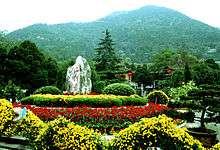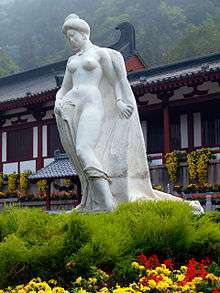Huaqing Pool

| Huaqing Pool | |||||||||||||||||||||
| Traditional Chinese | 華清池 | ||||||||||||||||||||
|---|---|---|---|---|---|---|---|---|---|---|---|---|---|---|---|---|---|---|---|---|---|
| Simplified Chinese | 华清池 | ||||||||||||||||||||
| |||||||||||||||||||||
Huaqing Pool (Chinese: 华清池) or the Huaqing Hot Springs are a complex of hot springs located in an area characterized by mild weather and scenic views at the northern foot of Mount Li, one of the three major peaks of the Qin Mountains. The Huaqing Hot Springs are located approximately 25 km east of Xi'an (formerly Chang'an, the western capital of the Tang dynasty), now in the province of Shaanxi, China. It was built in 723 by Emperor Xuanzong of the Tang dynasty as part of the Huaqing Palace (華清宮), using the locally-occurring geothermal heating, and is famous as the supposed scene of Xuanzong's romance with his consort Yang Guifei.[1] This site was also the scene of the 1936 Xi'an Incident, when Chiang Kai-shek was kidnapped by former warlord Zhang Xueliang and forced to participate in a United Front with the Chinese Communist Party to oppose Japanese encroachment on China.[2]
Huaqing Pool is now an important tourist spot, classified as a AAAAA scenic area by the China National Tourism Administration.[3]
History
The site features a long documented history of almost three millennia, having served as the location for several palaces built during the reigns of past Chinese dynastic rulers, including King You of the Zhou dynasty, Qin Shi Huang of the Qin dynasty, and an expanded version by Wu Han of the Han dynasty. Under the Tang emperors Taizong and Xuanzong, the palace structure was rebuilt and renamed the Huaqing Palace. However, during the events associated with the An Lushan rebellion, considerable damage was done to the site. Nevertheless, the historical legacy of the Huaqing pools has received lasting commemoration, such as in the following mention of Emperor Xuanzong and Yang in Bai Juyi's poem "Song of Everlasting Regret":
- On a cold spring day, he bestowed upon her the honor of bathing with him at the Huaqing pools,
- According to legend, this is the pool that was used by Yang Guifei and the emperor.
- The waters of the hot springs were smooth, and washed over her pale white skin.
- The palace maids helped her to leave the pool, because she was too delicate and lacked strength.
- This was when she began to receive the emperor's advances.
Gallery
 Guifei Pond (貴妃湯).
Guifei Pond (貴妃湯). Lianhua Pond (蓮花湯).
Lianhua Pond (蓮花湯). Statue of Yang Guifei.
Statue of Yang Guifei.- Stone carving Huaqing Pool.
- Huaqing Pool with artificial lotus.
- Guifei Spring (‘The Lady's Spring’).
- Feishuang Hall (‘Hall of the Drifting Frost’).
- One of the Huaqing Pool's murals.
- "Lady Yang's Pool", a reconstructed Qing version, later used by Chiang Kai-shek.
 Statue of Lady Yang coming out of the bath.
Statue of Lady Yang coming out of the bath.
See also
| Wikimedia Commons has media related to Huaqing Pool. |
- Fu (poetry)#Eastern Han
- "华清池" in zh.Wikipedia (in Chinese)
- Yang Guifei
References
- ↑ China: Five Thousand Years of History & Civilization (Hong Kong: City University of Hong Kong Press, 2007), p. 770.
- ↑ Ray Huang, China: A Macro History (New York: M.E. Sharpe, 1997), p. 4.
- ↑ "AAAAA Scenic Areas". China National Tourism Administration. 16 November 2008. Retrieved 9 April 2011.
External links
- "The Huaqing Palace in the heyday of Tang dynasty". The missing ancient architectures. Episode 4. China Central Television. CCTV-9. (English subtitle)